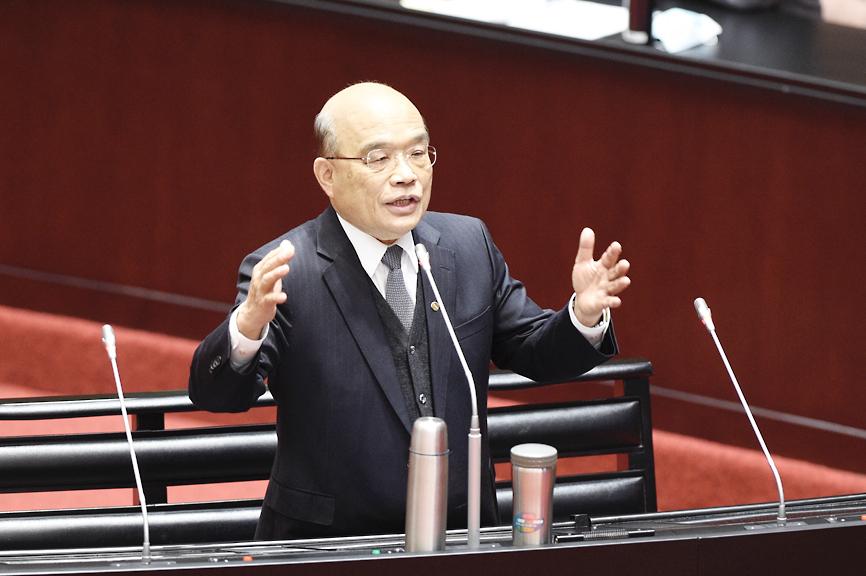The government is to establish a dedicated center to improve disease prevention, injecting NT$4 billion (US$132.88 million) over the next seven years into the project, Executive Yuan spokeswoman Kolas Yotaka said yesterday.
Premier Su Tseng-chang (蘇貞昌) on Wednesday approved a Ministry of Health and Welfare proposal to build a center for disease prevention, which is to be in the ministry’s compounds in Taipei’s Nangang District (南港), with construction scheduled to begin next year and be completed in 2027, Kolas said.
The center would fight known viruses and communicable diseases, with key tasks including inspection efforts, and research and development of vaccines and biopharmaceuticals, Kolas said, adding that it would also serve as a hub to ration out goods during epidemics.

Photo: George Tsorng, Taipei Times
Starting next year, costs would be included in annual funds for general public affairs, Kolas said, adding that no special funds would be used for the project.
In other developments, a Cabinet official said that from Wednesday next week, people would be able to preorder their two-weekly quota of masks at the nation’s four major convenience store chains.
People would be able to preorder masks every two weeks at FamilyMart, 7-Eleven, OK Mart and Hi-Life convenience stores using their National Health Insurance (NHI) cards, the official said.
They would also be able to have masks delivered to Pxmart or Simple Mart outlets, but the supermarket chains cannot take orders, as they do not have NHI card readers, the official said.
Payment methods for the store system have yet to be determined, the official said.
Convenience store services are expected to ease congestion at NHI-affiliated pharmacies, where people usually have to wait in long lines to buy masks.
The Cabinet official said that 240 of the more than 6,000 designated pharmacies have asked to withdraw from the program because they do not have enough staff to handle daily sales.
Since the mask rationing program started on Jan. 31, the quota for each person has been increased from two to three per seven days and then to nine per 14 days, with the sales platform expanding from pharmacies to a government Web site and a mobile app.

The Central Election Commission has amended election and recall regulations to require elected office candidates to provide proof that they have no Chinese citizenship, a Cabinet report said. The commission on Oct. 29 last year revised the Measures for the Permission of Family-based Residence, Long-term Residence and Settlement of People from the Mainland Area in the Taiwan Area (大陸地區人民在台灣地區依親居留長期居留或定居許可辦法), the Executive Yuan said in a report it submitted to the legislature for review. The revision requires Chinese citizens applying for permanent residency to submit notarial documents showing that they have lost their Chinese household record and have renounced — or have never

A magnitude 5.6 earthquake struck off the coast of Yilan County at 12:37pm today, with clear shaking felt across much of northern Taiwan. There were no immediate reports of damage. The epicenter of the quake was 16.9km east-southeast of Yilan County Hall offshore at a depth of 66.8km, Central Weather Administration (CWA) data showed. The maximum intensity registered at a 4 in Yilan County’s Nanao Township (南澳) on Taiwan’s seven-tier scale. Other parts of Yilan, as well as certain areas of Hualien County, Taipei, New Taipei City, Taoyuan, Hsinchu County, Taichung and Miaoli County, recorded intensities of 3. Residents of Yilan County and Taipei received

Taiwan has secured another breakthrough in fruit exports, with jujubes, dragon fruit and lychees approved for shipment to the EU, the Ministry of Agriculture said yesterday. The Animal and Plant Health Inspection Agency on Thursday received formal notification of the approval from the EU, the ministry said, adding that the decision was expected to expand Taiwanese fruit producers’ access to high-end European markets. Taiwan exported 126 tonnes of lychees last year, valued at US$1.48 million, with Japan accounting for 102 tonnes. Other export destinations included New Zealand, Hong Kong, the US and Australia, ministry data showed. Jujube exports totaled 103 tonnes, valued at

BIG SPENDERS: Foreign investors bought the most Taiwan equities since 2005, signaling confidence that an AI boom would continue to benefit chipmakers Taiwan Semiconductor Manufacturing Co’s (TSMC, 台積電) market capitalization swelled to US$2 trillion for the first time following a 4.25 percent rally in its American depositary receipts (ADR) overnight, putting the world’s biggest contract chipmaker sixth on the list of the world’s biggest companies by market capitalization, just behind Amazon.com Inc. The site CompaniesMarketcap.com ranked TSMC ahead of Saudi Aramco and Meta Platforms Inc. The Taiwanese company’s ADRs on Tuesday surged to US$385.75 on the New York Stock Exchange, as strong demand for artificial intelligence (AI) applications led to chip supply constraints and boost revenue growth to record-breaking levels. Each TSMC ADR represents